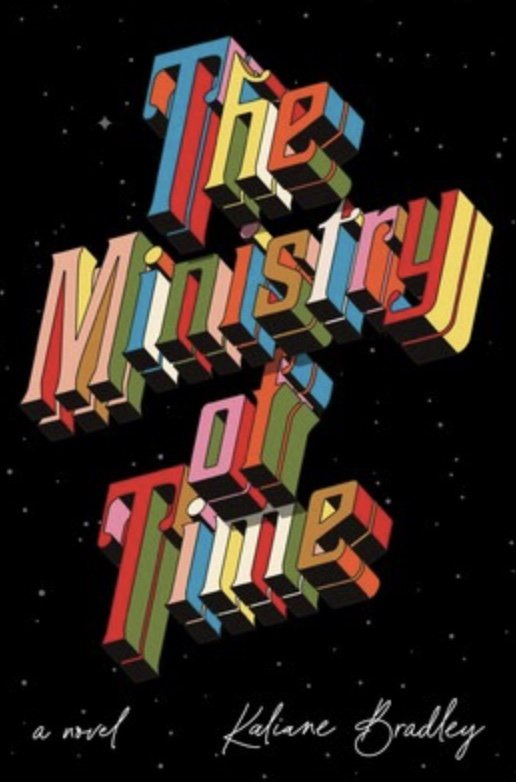The Ministry of Time by Kaliane Bradley (Simon & Schuster, release date May 2024)
You don’t like fantasy or science fiction? You shy away from thrillers populated with members of His Majesty’s Secret Service? You’d rather be flogged than read a romance novel? Me too--which is why I almost didn’t pick up Kaliane Bradley’s The Ministry of Time. And that would have been a shame. This novel, based heavily upon time travelers who have been shanghaied from different periods of history and are placed, against their will, in the 21st Century, blends all of the genres I despise and comes up with one of my favorite books of this year.
Graham Gore, an officer of the British Royal Navy who died during an ill-fated polar expedition in 1847, is only one of five “expats from history” who have been conveyed out of their own era into modern England. Each one of them is under intense scrutiny from the Ministry of Defense, who has chosen “handlers” who will live with them for their first year in another century.
Gore’s handler is a young woman who has probably been selected for the job because her English father married a woman who had escaped Pol Pot’s Reign of Terror in Cambodia. A translator-consultant specializing in Southeast Asia and the Khmer language, she has lived with a displaced person all her life, a “mother who persistently carried her lost homeland jostling inside her like a basket of vegetables.”
Gore, a thirty-seven-year-old military man who died as the Victorian era was just taking hold, is puzzled and frequently shocked by the young woman he will be confined with for a year. When she tells him that in their new residence, there’s “No maid. No cook either,” Gore turns pale. When his housemate utters “Damn,” within his hearing, he’s as horrified as he is when she tells him about the existence of germs. The two of them move through their living quarters like “clots in a lava lamp,” Very gradually, in ways that are both highly strained and very funny, they forge a friendship that begins to test the handler’s loyalty to the ministry that employs her.
Gore and the four other “expats” see themselves as “kidnap victims, mostly,” and as they learn about the time and place they’ve been forced to live in, they begin to question the motivation behind it. In rooms “designed to encourage bureaucracy,” they’re tested physically and mentally and come to realize they’re intended to serve a definite purpose, one that they and their handlers can’t fathom. Gore in particular resists this unknown result, “as if assimilation was a form of treachery to his past.” He, however, with his intelligence and charm, seems to be the most attractive candidate for the Ministry’s purposes, and his handler, against her better judgment, also finds she’s vulnerable to those same attractions.
When one of the handlers disappears and a mysterious Brigadier comes on the scene, both Gore and his handler unite in figuring out whatever plot is brewing, while at the same time they fall in love.
If this sounds hackneyed, guess again. Gore’s handler is the narrator of this convoluted story and she’s a woman with a sharp wit and a well-furnished mind. Her observations are wide-ranging and piercing, acerbic and laugh-out-loud funny. Her Cambodian-English bloodline has given her a name that few people can pronounce so she goes without it throughout the entire novel. Her family history also leads her to thoughts of inherited trauma and “how socially awkward it is live with.” “My face does a good impression of whiteness,” she says, grateful that her appearance isn’t “dragging a genocide around, which is good because that sort of thing makes people uncomfortable.” When her sister writes about her mixed-race background, the narrator wonders if the memoir is an act of “reclamation” or a way of leaving “all our wounds open to the dirty world.”
Her voice is interspersed with Gore’s memories of being trapped in the Arctic, on a ship immobilized by ice that “tilts queasily to one side,” and “bellows in agony.” Gore and his comrades are tortured by “the persistent grieving and shrieking of the wood…that robs them of sleep and silence.” “The northern seas are full of teeth,” and lead to terrible deaths.
When Gore and the narrator fall in love, they hold each other “the way that poems hold clauses.” “He lives in me like trauma does,” the narrator says when the two of them are separated. Believe me, this is not the sort of romance found in the usual bodice-ripper.
British Cambodian author Kaliane Bradley has filled The Ministry of Time with writing that has devilish twists and carries a haunting depth, along with sentences that made me gasp one minute, laugh the next. Who else but this writer could resurrect a dim historical figure from the 19th century, use facts from his life along with a single image of his face on a daguerreotype, and make him a figure unique in modern-day fiction? Bradley’s sharp, savage, and satirical voice is mingled with tenderness and brilliant flares of imagination. It’s addictive and I want more.~Janet Brown
